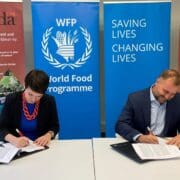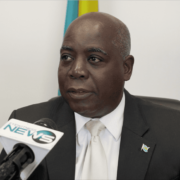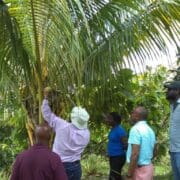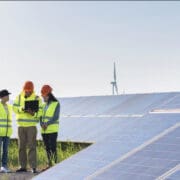Black Immigrant Daily News
The writer is Antigua and Barbuda’s Ambassador to the U.S. and the OAS. He is also a senior fellow at the Institute of Commonwealth Studies at the University of London and at Massey College in the University of Toronto. The view expressed are entirely his own.
By Sir Ronald Sanders
“The world is facing a crisis of development.” Those are the first words of a paper from officials of the World Bank Group (WBG), setting out a proposed roadmap for “urgent action” to tackle the “growing crisis of poverty and economic distress, and global challenges, including climate change, pandemic risks, and rising fragility and conflict”.
These are all conditions that impact developing countries, across the globe, and more particularly small economies. To these conditions must be added, high cost of living, resulting from both the economic effects of the Covid-19 pandemic and the Russian war on Ukraine.
Yet, the World Bank claims it is not able to lead such urgent action even though, as the world’s major funder of development, it should be. In its own roadmap paper, the Bank discloses that its “2018 Capital package was designed to be prepared for one mid-sized crisis a decade, and not multiple overlapping crises”. It goes on to say that Bank support “is set to decline starting [in the] Financial Year 2024 and, in real terms, Bank support today is below the levels of the 1980s”.
Worsening the situation is that the populations of low-income countries are expected to rise by 25 percent by 2050, requiring more funding from the Bank if it is to be helpful in averting economic catastrophe in these countries.
In other words, the Bank says it does not have sufficient funds to cope with the needs for development financing and thus, has called for “a massive step up in the international community’s support”. Clearly, the Bank either recognizes, or has been told by the powerful governments, which control its policies, that they are unwilling to provide more resources. Therefore, the policymakers have introduced the notion that the private sector should be encouraged to contribute to multilateral financing. In part, this is why the Biden Administration of the United States of America has nominated Ajay Banga, an Indian-American national and former Chief Executive Officer of MasterCard, to be President of the Bank.
Even accepting Mr. Banga’s skills in business, it is left to be seen if he will be successful in mobilizing the scale and type of financial contribution and participation that the Bank now evidently requires to fulfil its mandate.
Caribbean small states will be among the principal sufferers from the Bank’s resource constraints. In a separate paper entitled, “Overlapping Crises, Multiple Challenges,” Bank officials detail a gloomy picture of the current situation of these countries and their prospects. Among the conditions is the rise in interest rates, which will make refinancing of existing debt more burdensome, and affording new borrowing almost impossible. In several Caribbean small states, debt service is already above the threshold of 10 percent of exports of goods (including tourism). Indeed, debt service in some Caribbean states exceed the acceptable threshold even more.
Increased interest rates will make it exceedingly difficult for those Caribbean small states, which are described as ‘high income,’ to cope with the increase in cost of money. Among these states are Antigua and Barbuda, The Bahamas, Barbados, St, Kitts-Nevis and Trinidad and Tobago. Despite the protests and rigorous arguments of these countries that ‘high income’ is not, by itself, a determinant of underdevelopment, and that they share similar, if not exact circumstances of other small states, the policy makers at the Bank and the International Monetary Fund, are adamant in not amending the criterion. Indeed, one World Bank Executive Board member, officially representing the Caribbean, unflinchingly declared that seeking concessionary financing for ‘high income’ small Caribbean states was an “ask” that would not be fulfilled.
The paper on the overlapping crises that confront small states, provides a prescription of actions that small states should take to “mitigate the effects of global inflation, and position their economies to move past Covid-19”. One of the prescriptions is that “expenditure restraint – particularly of recurrent spending would bolster fiscal positions and reduce the need for additional debt.” At a time of high inflation, affecting the cost of living of people, decreased government revenues, and the need to cushion costs to the poor and vulnerable, the prescriptions could have benefitted from a more realistic approach, based on direct consultation with small states.
A more practical proposal in the paper was that “the international community can help by scaling up non-concessional official financing, concessional financing, and grants; helping to leverage private sector financing; and upgrading the international architecture for dealing with excessive debt”. However, nothing has happened in recent years to inspire belief that the wealthy countries will become more responsive to the urgent development needs of developing countries, particularly small states.
Among many disheartening events are the failures of rich nations to honour their commitments to fund resistance and resilience to the adverse effects of Climate Change, and their lukewarm response to the urgings of small states for compensation for loss and damage that they endure every day.
As the roadmap paper points out, “richer countries, which significantly expanded their economies over the last decades, were the largest contributors of CO2 emissions, while small states are the most affected and face the most significant costs of adaptation.” The injustice cannot be more blatantly obvious.
There is also one fast emerging issue that the Bank does not mention in either of its papers. That issue is the threat to the rule of law and democracy, within countries, that is now posed by the high rate of inflation, the significantly higher costs of certain foods, and higher interest rates.
These have combined to create dissatisfaction amongst populations, leading to a clamour for increased wages, and to protests and demonstrations in some countries, either opportunistically organised, or encouraged, by opposition political parties. These demands cannot be easily satisfied by small economies which are still struggling to recover from the impact of Covid-19, and which are now engulfed by the soaring prices that are a consequence of the Russian war on Ukraine.
The crises that small states face call for responsibility by all; not the feckless pursuit of narrow political ambitions, the resultsd of which will be disastrous for all.
The policy makers at the World Bank and the IMF should listen before deciding, and in doing so they should contemplate the consequences of rigid positions at a time when the world would benefit for flexibility and mutually beneficial cooperation.
Donate At Caribbean News Service, we do not charge for our content and we want to keep it that way. We are seeking support from individuals and organisations so we can continue our work & develop CNS further.
NewsAmericasNow.com










